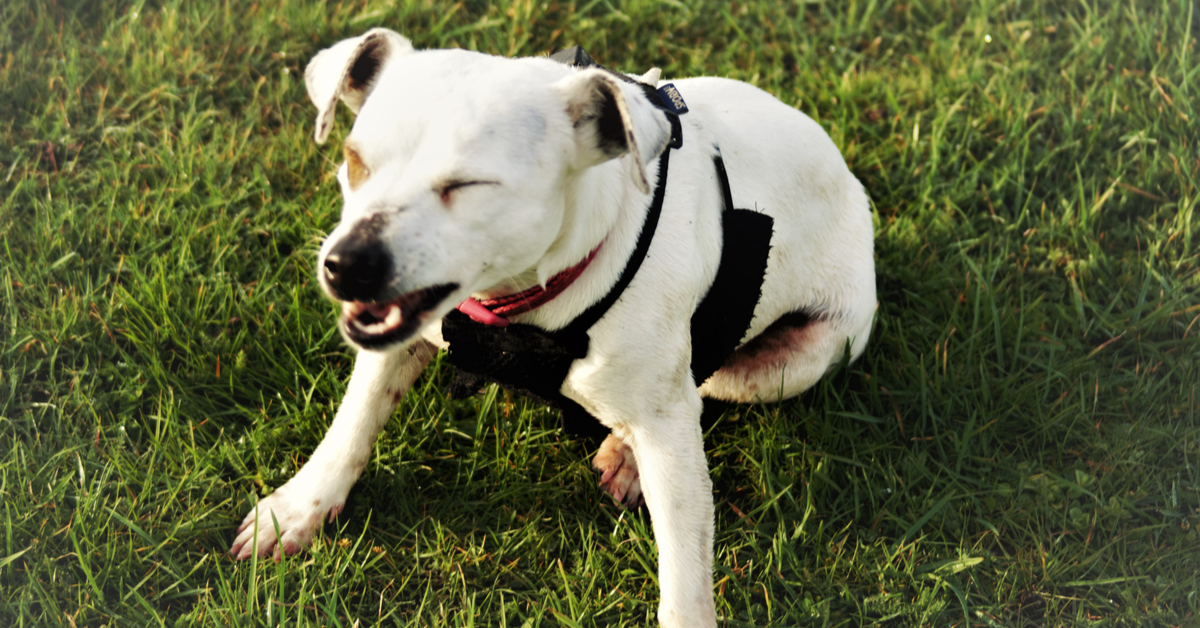Can dogs catch a cold? Yes, dogs can catch a cold. Dog colds have similar symptoms to human colds from congestion to sneezing. Cold viruses in dogs include Bordetella bronchiseptica (aka kennel cough or adenovirus) and canine respiratory coronavirus.
In addition to the different viruses of the common cold, dogs can also get the flu (aka canine influenza). While cold symptoms in dogs can be similar to dog flu symptoms, they are not the same.
Cold and flu season is coming up. In this blog post, we’re going to break down the symptoms and treatments of both, as well as what to expect during the recovery process for dogs and cats.
Dog Cold Symptoms vs. Dog Flu Symptoms

Dog colds are more than just sniffles. According to veterinarians at the Animal Clinic of Woodruff, dog cold symptoms include:
- nasal discharge
- labored breathing from congestion
- sneezing
- watery eyes
- lethargy
A dog’s cold symptoms typically last 5-10 days and don’t always require a vet visit. If the symptoms aren’t severe, you can care for your pup at home by proving lots of water and humid air if they are congested. A humidifier will help ease the sniffling and coughing. You could also let your dog in the bathroom while you take a hot shower to let the steam act as a humidifier.
If your dog’s cold-like symptoms are getting worse over time or your dog has a loss of appetite, then make an appointment with your DVM as soon as possible. If you have a brachycephalic dog breed like a pug or French bulldog, they will suffer more quickly from respiratory disease due to their pre-existing health issues and breathing problems. Get them seen by the vet right away.
Canine flu symptoms
According to North Carolina State University’s College of Veterinary Medicine, dog flu symptoms include:
- cough
- runny nose
- fever
- difficulty breathing
However, the Center for Disease Control (CDC) notes that not all dogs with the parainfluenza virus show signs of illness.
Treatment for canine influenza virus includes keeping your dog hydrated and comfortable while as he builds an immune response to the infection. Your veterinarian might take x-rays and blood tests to ensure it’s not more serious, and prescribe a cough suppressant and broad-spectrum antibiotics if a secondary bacterial infection is suspected.
How Do Dogs Get Colds and Viruses?

Your dog could have caught a cold or flu virus in a number of ways. One of the most common ways infection spreads is at dog parks, shelters, and doggy daycares. A cold can spread through shared water bowls, dog food bowls, or saliva droplets from another dog’s cough.
Common dog colds and flu are highly contagious to other dogs. If you have more than one dog and one of them has a respiratory infection or cold, it’s important to keep them separate from other dogs. In addition, keep your dog away from the dog park until his immune system has fully recovered.
Is it life-threatening?
Here’s what the CDC has to say: “The percentage of dogs infected with this disease that die is very small. Some dogs have asymptomatic infections (no signs of illness), while some have a severe illness with infection. Severe illness is characterized by the onset of pneumonia.”
Can I give my dog a cold?
No, the chance of pet owners giving their dogs a cold is very low.
What If It’s Not a Cold or Flu? Common Causes of Dog Congestion

Your dog can be congested without having a cold or flu virus. If your pooch is coughing, snorting, and honking without any other cold or flu symptoms, it could be something else ranging from fungal infections to seasonal allergies.
When your dog sounds congested, there could be a foreign object stuck in his nasal passages as well. If a foreign body is stuck in your dog’s nose, they will likely start reverse sneezing to try to get their sinus and airway unobstructed.
On the other hand, improper airflow and trouble breathing could be rhinitis, a common upper respiratory infection in dogs. Mild cases can be treated with antibiotics and antihistamines like benadryl. If your dog is in pain there are home remedies as well.
Sometimes a dog’s nasal congestion can be a sign of a more serious condition like a tumor, collapsing trachea, or heart disease. Washington State University says that if your dog’s coughing is related to heart disease or heart failure, the coughing will occur after exercise or excitement.
Prevention
If your dog’s breathing is irregular or if he has a stuffy nose, don’t panic. Pay attention to their breathing patterns over time to determine if you need to make an appointment with the vet.
Most of all, don’t forget preventative measures! Always make sure your dog is up-to-date on core vaccines that will protect him from developing and serious health conditions. Canine distemper and bordetella vaccines are crucial.

